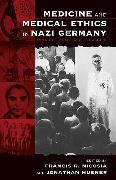- Start
- Medicine and Medical Ethics in Nazi Germany
Medicine and Medical Ethics in Nazi Germany
Angebote / Angebote:
Brief and synthetic as the essays are, they will . . . be of most use to students or to those new to the field. However, they provide engaging reading for those with more in-depth knowledge too." · Journal of Modern History "Educators and students owe a debt of gratitude . . . all of the articles in this anthology are readily accessible to the non-specialist without compromising the cutting-edge scholarship that informs them." · ISIS "This in an engrossing book . . . morally challenging to all physicians." · Journal of the American Medical Association ". . . extraordinarily valuable essays combine perspectives from history, sociology, demography, and anthropology." · Choice ". . . excellent orientation for undergraduate and graduate students, as well as physicians and the general public . . . All in all, this is a stimulating set of essays that deserves a wide readership." · H-German The participation of German physicians in medical experiments on innocent people and mass murder is one of the most disturbing aspects of the Nazi era and the Holocaust. Six distinguished historians working in this field are addressing the critical issues raised by these murderous experiments, such as the place of the Holocaust in the larger context of eugenic and racial research, the motivation and roles of the German medical establishment, and the impact and legacy of the eugenics movements and Nazi medical practice on physicians and medicine since World War II. Francis R. Nicosia is professor of History at Saint Michael's College in Vermont where he teaches courses on modern German and European history and the Holocaust. Jonathan Huener is assistant professor of History at the University of Vermont where he teaches courses on the Holocaust, German history, and Polish history.
Lieferbar in ca. 10-20 Arbeitstagen


